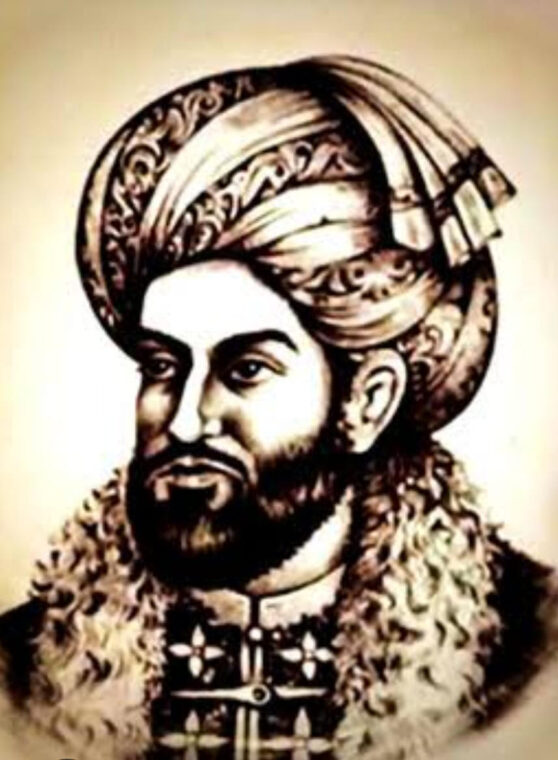By: Ahsan Ansari
Ahmad Shah Abdali, also known as Ahmad Shah Durrani, was one of the most influential figures of the 18th century. He was not only a great military leader but also a capable ruler and politician. He founded the Durrani Empire and left an indelible mark on South Asian history. His conquests and leadership earned him the title of the “Father of Modern Afghanistan,” and his legacy remains a significant part of Afghan and South Asian history.
Ahmad Shah Abdali was born in 1722 near Multan, in the Pashtun Sadozai tribe, which was then part of the Mughal Empire and is now in modern-day Pakistan. His father, Muhammad Zaman Khan, was a prominent tribal chief, but Ahmad Shah faced hardships and political conflicts early in life after his father’s death. These circumstances prepared him to face life’s tough challenges.
At a young age, Ahmad Shah joined the army of the renowned Persian king Nader Shah. By the age of 19, his bravery and strategic skills brought him recognition. During Nader Shah’s campaign in India in 1739, Ahmad Shah played a significant role, gaining the king’s trust and being appointed the commander of the Abdali forces.
After Nader Shah’s assassination in 1747, Ahmad Shah seized the opportunity to unite the Afghan tribes. He convened a tribal council in Kandahar, where he was elected king, thus founding the Durrani Empire. This new empire established a powerful and unified Afghan state encompassing modern Afghanistan, Pakistan, parts of eastern Iran, and northern India.
Ahmad Shah Abdali conducted numerous military campaigns to expand and consolidate his empire. His most notable campaigns involved conflicts with the declining Mughal Empire, the Maratha Confederacy, and the emerging Sikh powers. Between 1748 and 1767, Ahmad Shah launched several invasions into India, driven by economic benefits, political control, and the weakening Mughal influence.
One of his greatest achievements was the conquest of Delhi in 1757, where he acquired immense wealth, including the famed Koh-i-Noor diamond. The Third Battle of Panipat in 1761 was Ahmad Shah’s most significant victory. This battle was fought against the Maratha Confederacy, a powerful force from southern India. Leading a coalition of Afghan tribes and local allies, Ahmad Shah delivered a decisive blow to the Marathas. This battle, one of the bloodiest of the 18th century, reshaped South Asia’s political landscape.
Ahmad Shah also conducted campaigns against the rising Sikh power in Punjab. While he captured key cities like Lahore and Amritsar, the Sikhs persistently resisted his rule. After his death, the Sikhs consolidated their power and emerged as a dominant force in the region.
Ahmad Shah was not only a conqueror but also an effective administrator. He promoted trade, improved infrastructure, and encouraged cultural revival in his empire. During his reign, arts, literature, and architecture flourished. He introduced a system of tribal alliances, maintaining balance among various Afghan tribes, which strengthened his rule and ensured military success.
Ahmad Shah Abdali passed away in 1772 at the age of 50 in Kandahar, where he was laid to rest. His mausoleum remains a significant symbol of Afghan history and culture, attracting thousands of visitors annually to pay their respects.
Ahmad Shah Abdali’s legacy holds a vital place in South Asian history. His conquests laid the foundation of modern Afghanistan and fostered a sense of unity and identity among Afghan tribes. His invasions accelerated the decline of the Mughal Empire and checked the rise of the Marathas, creating a power vacuum later filled by the British East India Company. Ahmad Shah achieved not only political and military success but also contributed to the growth of arts and literature. As a great conqueror and wise ruler, he reshaped the geopolitical and cultural landscape of South Asia through his strategies and governance. His leadership remains a beacon of inspiration for Afghans, and his legacy will forever be etched in the annals of history.
Ahmad Shah Abdali’s era stands as a testament to the power of strong leadership and strategy in transforming a nation’s destiny. His character, achievements, and vision represent a time when leadership was not just about conquests but also about working for the welfare of the people.
(Email: aahsan210@gmail.com)




